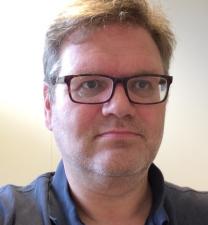
René van Horik is based in The Hague where he is the EUDAT project coordinator at the Data Archiving and Networked Services (DANS) institute, which is part of the Royal Netherlands Academy of Arts and Sciences (KNAW). René is coordinating the EUDAT training programme and in this article he introduces us to DANS and its mission.
DANS – Data Archiving and Networked Services – promotes sustained access to digital research data, mainly for the humanities and social sciences research areas. In this regard, DANS encourages scientific researchers to archive and reuse data in a sustained form, for instance via the online archiving system EASY and with the DataverseNL service for storing and sharing data during the research process. Through NARCIS, DANS also provides access to thousands of scientific datasets, publications and other research information in the Netherlands. Furthermore the institute provides training and consultancy and also carries out research on sustained access to digital information.
As part of its mission, DANS supports the Open Access principle that promotes unrestricted online access to research and research data, while being aware of the fact that not all data can be freely available without limitations at all times. Even so, it is important that research data that is not available (yet), or that is only available to a limited degree, is archived in a sustainable manner. Therefore, DANS applies the principle “Open if possible, protected if necessary”.
DANS is a member of Research Data Netherlands (RDNL), which is a national coalition of research data archives that was established to promote long-term archiving and reuse of research data. For example, the “Essentials 4 Data Support” course on research data management is one of the training activities produced by RDNL.
Driven by data, DANS ensures the ongoing improvement of access to digital research data via its services and participation in both national and international projects and infrastructures. EUDAT is one of the important projects in this respect.
DANS joined the EUDAT initiative in March 2015 and is now one of the 35 partners in the EUDAT project. The activities of DANS in the project are aimed at the following:
- improving the quality of data repositories by putting effort into some form of formal certification (For this, we are using the Data Seal of Approval which is described in more detail later in this article),
- coordinating the training activities in EUDAT (which are aimed at spreading knowledge about the EUDAT services and increasing their usage),
- liaising with scholars and research infrastructures in the humanities, for example, via the DARIAH infrastructure in order to bring the EUDAT services to the attention of this specific target group, and
- participating in the development of a sustainable business model for the EUDAT services so they will continue to be available once the project ends.
There are many reasons why research data is not findable, accessible, usable, citable and reliable anymore: file format obsolescence, software and hardware companies going out of business, technical and human failures, the problems caused by lost, inadequate or non-existent documentation, and unforeseen disasters are just some of the potential problems that plague longer term data storage. Fortunately storing research data in a trusted digital repository can take away (a lot of) the worry. But what is a trusted digital repository? And which organisation or system can I entrust with my data? A number of initiatives have formulated formal “trust” requirements for repositories to comply with, and, in several cases, auditing procedures to check and assess the level of trustworthiness are included. The audit and certification approach that has the lowest threshold with respect to required resources and applicability is the Data Seal of Approval (DSA). DANS actually formulated the guidelines for the DSA and initiated the international governance structure to spread the concept of the DSA and manage its usage. Organisations can gain DSA certification through a self-assessment of the organisation and its systems that is based on the DSA guidelines and reviewed by peers.
The DSA fits perfectly with the mission of EUDAT, as it contributes to the durability and long-term accessibility of research data. Together with several other EUDAT partners, DANS is helping to introduce and apply the DSA within EUDAT.
For more information on the DANS organization and services, please visit the DANS website: dans.knaw.nl/en. If you would like to know more about the role of DANS within EUDAT, please contact me directly: rene.van.horik@dans.knaw.nl.
